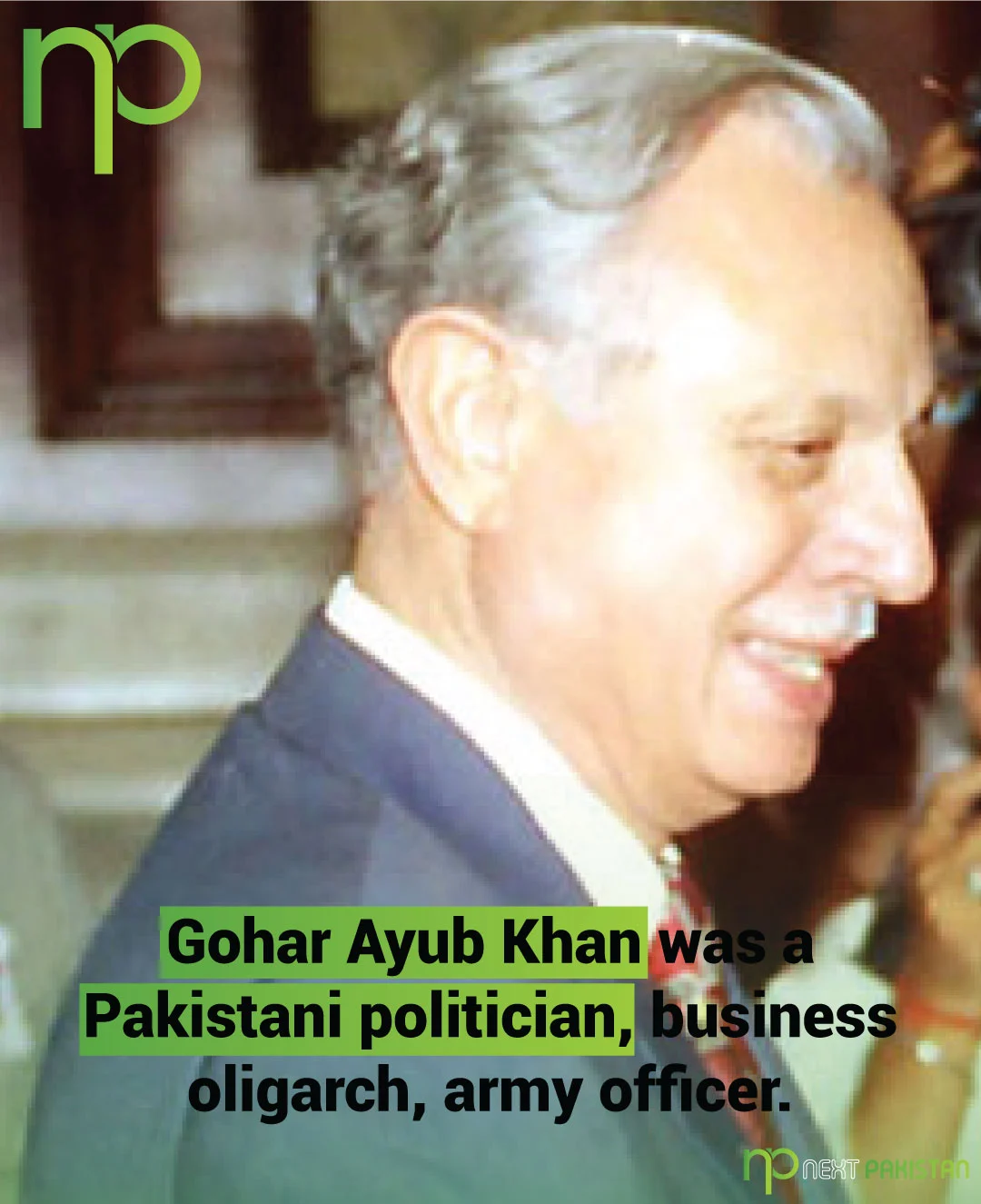
- November 19, 2023
- ubaidah khan
- 0
Gohar Ayub Khan, born on January 15, 1937, in the village of Rehana in the Haripur District of Khyber Pakhtunkhwa province, Pakistan, belonged to the Tareen tribe of ethnic Pashtuns. Proficient in Hindko, Pashto, Urdu, and English, he played a crucial role in upholding his father, former President and Field Marshal Ayub Khan’s, rule following the contentious 1965 presidential election.
Having received his education at the esteemed Royal Military Academy Sandhurst, Gohar Ayub Khan joined the Pakistan Army in 1959. Throughout his military tenure, he served as his father’s aide-de-camp, accompanying him on various international trips. Despite his father’s backing, Gohar Ayub’s military career plateaued at the rank of Captain, and his army records included accusations of professional and behavioral misconduct.
Political Career
Venturing into the realm of politics, Gohar Ayub Khan transitioned from a military career to establish a business conglomerate in 1974. Despite this entrepreneurial endeavor, his true passion lay in politics. In the 1977 general election, he contested under the Independence Movement platform. Subsequently, he aligned himself with the Islamic Democratic Alliance (IDA) in 1988. Following the 1990 general election, he assumed the role of the fourteenth speaker of the National Assembly, marking the commencement of his successful political journey.
During his tenure as the Speaker of the National Assembly from 1990 to 1993, Gohar Ayub Khan exhibited leadership and adeptness in navigating parliamentary procedures. His extensive political experience and compelling oratory skills earned him the respect of his peers. He played a pivotal role in upholding order and fostering constructive debate during his time in this esteemed position.
Foreign Affairs and Water and Power Ministry
In 1997, following a substantial mandate from his constituency, Gohar Ayub Khan assumed the role of the twentieth Minister of Foreign Affairs, appointed by Prime Minister Nawaz Sharif. This appointment proved crucial as it coincided with heightened tensions between India and Pakistan, especially in the aftermath of India’s nuclear tests. Gohar Ayub openly supported Prime Minister Sharif’s decision to initiate Pakistan’s nuclear testing program in response to India’s actions.
However, his association with Nawaz Sharif deteriorated over time, leading to his reassignment as the Minister for Water and Power on August 7, 1998. In this significant role, he played a pivotal part in contributing to the development and management of Pakistan’s energy resources. Regrettably, his tenure in this capacity was abruptly cut short on October 12, 1999, following the military coup led by General Pervez Musharraf.
Business Wealth and Net Worth
Beyond the realm of politics, Gohar Ayub Khan delved into the business sphere, co-founding an industrial firm under the business umbrella of Universal Insurance Company Limited, established by his father-in-law. Employing pro-Western and pro-Capitalism policies, he swiftly ascended to become a formidable business figure. Estimates at the time indicated his personal wealth at $4 million, while his family’s wealth ranged from $10 to $20 million.
Post-Retirement and Controversies
Following his retirement from national politics in 2002, Gohar Ayub Khan redirected his focus towards writing and business pursuits. He authored the book “Glimpses into the Corridors of Power” and published his father’s diary, offering unique insights into Pakistan’s political landscape. Despite stepping away from the political stage, Gohar Ayub continued active involvement in business, assuming the role of Chief Executive at Universal Insurance and holding positions on the boards of various companies within the Bibojee Group, a conglomerate led by his in-laws, the Khan Khattak family.
Throughout his extensive career, Gohar Ayub Khan found himself embroiled in controversies, including accusations of wielding influence in support of his father following the allegedly rigged 1965 presidential election. Criticism also arose regarding his business connections, along with allegations of family corruption and cronyism. Despite these controversies, Gohar Ayub Khan’s impact on Pakistani politics and business has left an enduring mark on the nation’s history.